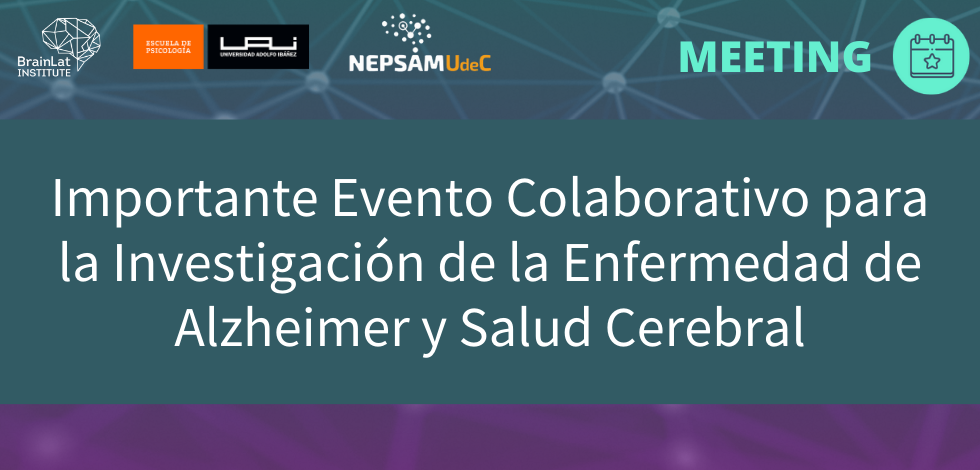Con un enfoque pionero en la comprensión de las complejidades de la enfermedad de Alzheimer y la salud cerebral, se llevó a cabo un destacado evento colaborativo en el Campus de la Universidad de Concepción. El Instituto BrainLat de la Universidad Adolfo Ibáñez y NEPSAM de la Universidad de Concepción se unieron para organizar esta importante actividad, que contó con la participación de distinguidos investigadores de ambos centros de investigación.
Los ponentes de este notable encuentro incluyeron a destacados representantes de BrainLat, como nuestra Codirectora Dra. Claudia Durán Aniotz, la Dra. Carolina Ochoa Rosales, el Dr. Hernán Hernández y la Dra(c). Paulina Orellana. Por parte de NEPSAM, se contó con la valiosa contribución del Director, el Dr. Luis Aguayo, la Dra. Estefanía Tarifeño, la Dra. Lorena Armijo, el Dr. Juan Luis Castillo, la Dra. Andrea Gajardo y el Dr. Diego Lorca. Además al inicio de la actividad el Decano de la facultad de Ciencias Biológicas de la Universidad de Concepción, Dr. Jorge Fuentealba nos dirigió algunas palabras en pos del encuentro.
El evento estuvo orientado hacia profesionales y estudiantes con el propósito de brindar una perspectiva global sobre las causas de la enfermedad de Alzheimer, así como integrar el uso de la epigenética y el machine y deep learning en nuestra comprensión de la salud cerebral. Se examinaron indicadores locales que resaltaron la necesidad urgente de realizar más investigaciones a nivel local para comprender el desarrollo de enfermedades como el Alzheimer en la región. El énfasis en el desarrollo local del conocimiento fue un tema crucial durante la actividad, subrayando la importancia del trabajo colaborativo entre instituciones, investigadores y entidades más allá del ámbito académico convencional.
Se presentaron ejemplos del trabajo sobresaliente del Instituto BrainLat en colaboración con destacadas organizaciones internacionales afines, como RedLat, el Trinity College y United Consortium, todas con un enfoque decidido en el avance del conocimiento en poblaciones poco representadas, como la latinoamericana.
El evento fue asistido por estudiantes y profesionales de diversos centros, destacándose la presencia de expertos del área de neurología del Hospital Guillermo Grantt Benavente. Durante el evento, se enfatizó la importancia de adoptar un enfoque práctico y cercano al conocimiento para impactar positivamente en los usuarios de los servicios de atención médica.
Se brindaron oportunidades para discusiones enriquecedoras, que permitieron profundizar en los temas presentados, aclarar dudas específicas y establecer proyecciones de trabajo futuro, con el objetivo de fomentar la colaboración entre nuestros centros de investigación y la participación de un mayor número de interesados.
Este evento destaca la importancia de la colaboración interinstitucional y multidisciplinaria en la investigación de la enfermedad de Alzheimer y la salud cerebral, enfatizando la necesidad de un enfoque integral y de amplio alcance para abordar estos desafíos médicos cruciales en la región. Esperamos como instituto que este sea solo el primero de muchas actividades en conjunto en pos del desarrollo de la salud cerebral en nuestro país y continente.
Important Collaborative Event for Alzheimer’s Disease and Brain Health Research
With a pioneering approach to understanding the complexities of Alzheimer’s disease and brain health, a prominent collaborative event took place at the University of Concepción’s campus. The BrainLat Institute at the Adolfo Ibáñez University and NEPSAM at the University of Concepción joined forces to organize this significant activity, which saw the participation of distinguished researchers from both research centers.
The speakers at this notable gathering included prominent representatives from the BrainLat Institute, such as our Co-Director Dr. Claudia Durán Aniotz, Dr. Carolina Ochoa Rosales, Dr. Hernán Hernández, and Dr(c). Paulina Orellana. NEPSAM made a valuable contribution through the participation of their Director, Dr. Luis Aguayo, Dr. Estefanía Tarifeño, Dr. Lorena Armijo, Dr. Juan Luis Castillo, Dr. Andrea Gajardo, and Dr. Diego Lorca. Additionally, at the beginning of the activity, the Dean of the Faculty of Biological Sciences at the University of Concepción, Dr. Jorge Fuentealba, delivered a few words to kick off the event.
The event was aimed at professionals and students with the purpose of providing a global perspective on the causes of Alzheimer’s disease, as well as integrating the use of epigenetics and machine and deep learning in our understanding of brain health. Local indicators were examined, highlighting the urgent need for more local research to understand the development of diseases such as Alzheimer’s in the region. The emphasis on local knowledge development was a crucial theme during the activity, underscoring the importance of collaborative work between institutions, researchers, and entities beyond the conventional academic sphere.
Examples of the outstanding work of the BrainLat Institute in collaboration with prominent international organizations such as RedLat, Trinity College, and the United Consortium were presented, all with a strong focus on advancing knowledge in underrepresented populations, such as the Latin American population.
The event was attended by students and professionals from various centers, with the presence of experts from the neurology area of the Guillermo Grantt Benavente Hospital being notable. During the event, the importance of adopting a practical and hands-on approach to knowledge was emphasized to positively impact users of healthcare services.
Opportunities for enriching discussions were provided, allowing for a deeper dive into the topics presented, clarification of specific doubts, and the establishment of future work projections, with the aim of fostering collaboration between our research centers and the participation of a greater number of interested parties.
This event highlights the importance of interinstitutional and multidisciplinary collaboration in Alzheimer’s disease and brain health research, emphasizing the need for a comprehensive and far-reaching approach to address these crucial medical challenges in the region. We hope, as an institute, that this is just the first of many joint activities for the development of brain health in our country and continent.

